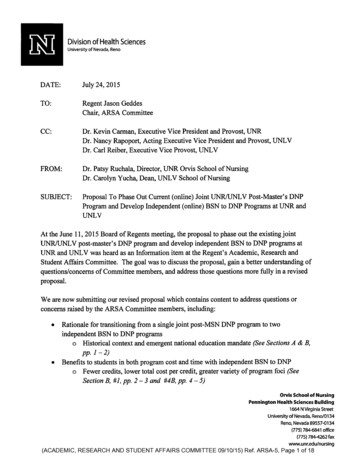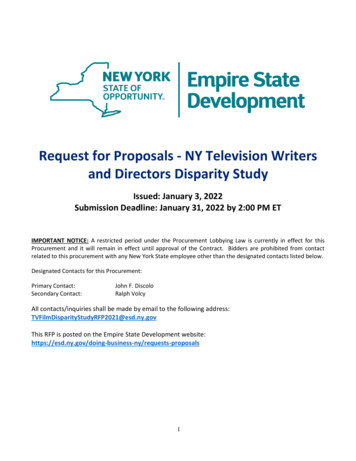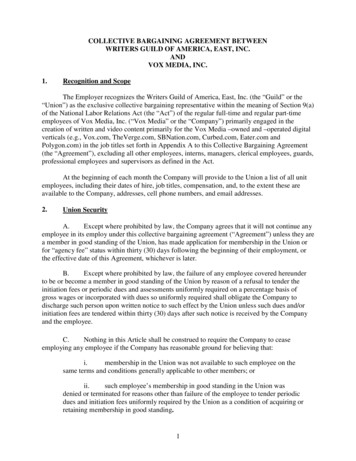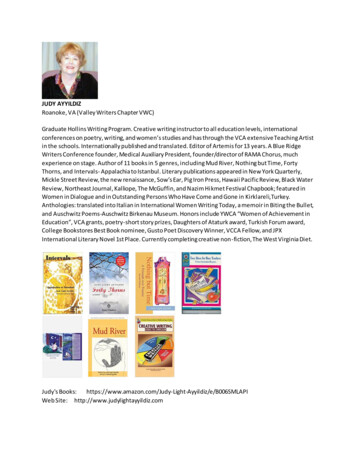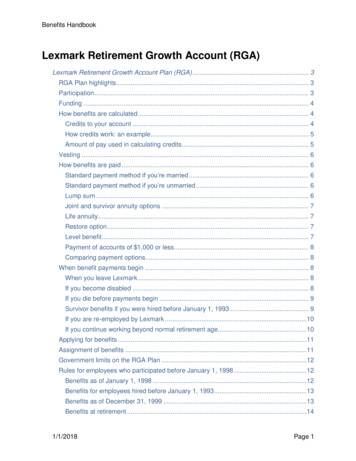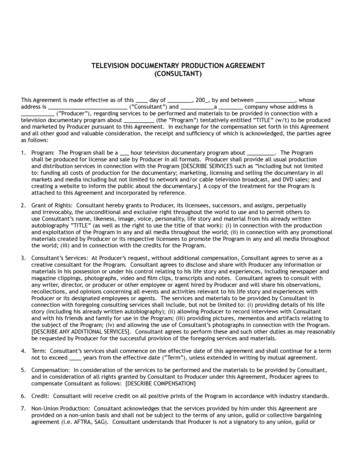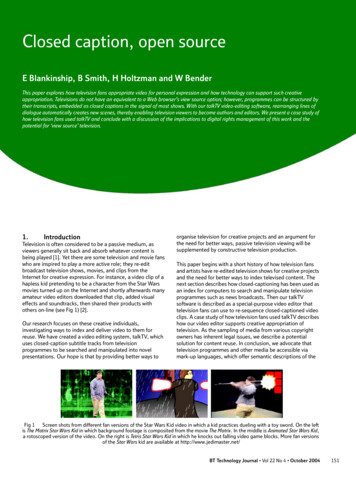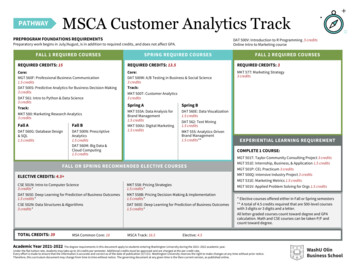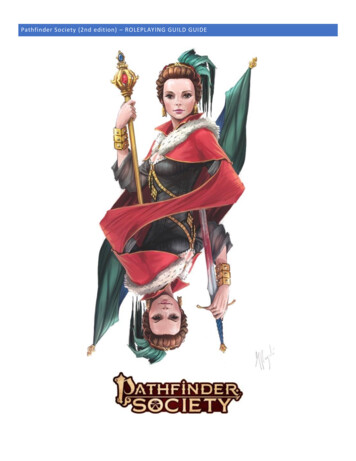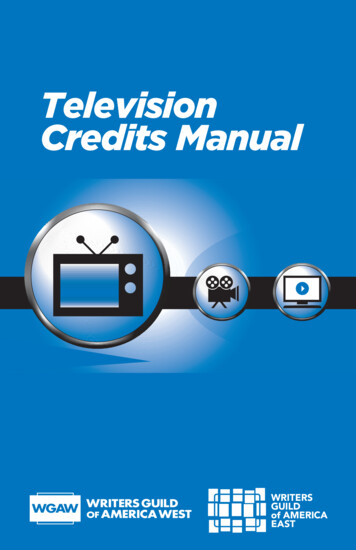
Transcription
TelevisionCredits Manual
ContentsEffective for Notices of Tentative Writing Credits submitted on orafter June 18, 2010.PREFACE.ivI. WORKING PROCEDURES. 1A. Writer’s Responsibility When Assigned. 11. Notify Other Writers on the Same Assignment. 12. File Contract at Guild Office. 13. Keep a Copy of All Work Done. 1B. Collaboration: A Team of Writers.2C. Writing Independently of Prior Scripts.2II. CREDIT DETERMINATION PROCEDURE. 4A. Notice of Tentative Writing Credit. 4B. What To Do Upon Receipt of Notice.5C. Agreement Among Writers. 6D. Arbitration. 61. Selection of Arbiters. 72. Television Credits Consultants.83. Anonymity of Arbiters and Consultants.84. Rights and Responsibilities of Participants.85. Pre-Arbitration Hearing.116. Procedure of Arbitration Committee.117. Appeals Before a Policy Review Board. 138. Notification. 159. Guild Decision Final. 15III. GUILD POLICY ON CREDITS. 17A. Definitions. 171. Writer.172. Literary Material.173. Source Material.17ii
4. Professional Writer. 18B. Rules for Determining Credit. 181. “Written by”. 182. “Story by”. 193. “Television Story by”. 194. “Teleplay by”. 205. “Adaptation by”.226. Variety or Audience Participation Shows. 237. Narration. 238. No Other Credits Approved. 24C. Production Executives. 241. Automatic Arbitration Provisions. 242. Notice Requirements. 24D. Remakes. 25E. Separation of Rights. 261. Introduction. 262. Definitions. 263. Who Is Eligible for Separated Rights.274. The Criteria. 285. Determining the Proportionate Share of SeparatedRights. 296. Procedure in the Event of a Disagreement Among theArbiters. 297. Procedure in Separation of Rights Arbitrations.308. “Developed by” Credit.30F. Withdrawal From Credit. 31G. Guild’s Right to Protest. 31H. Order of Names. 31I. Pseudonyms. 32J. Written Material Prevails. 33K. Revision of Script After Final Credit Determination. 33L. Publicizing of Credits. 33M. Conclusion. 33iii
PrefaceA writer’s position in the motion picture or television industry is determined largely by his/her credits. His/her professional status depends onthe quality and number of the screenplays, teleplays, or stories whichbear his/her name. Writing credit is given for the act of creation in writing for the screen. This includes the creation of plot, characters, dialogue,scenes and the other elements which comprise a teleplay.The administration of an accurate and equitable system of determining credits is, therefore, one of the most important services the Guildperforms for writers, and it is to a better understanding of this importantresponsibility that this Manual is dedicated.The Guild is asked numerous times a year to assist in the resolution ofcontroversies between writers over their credits. Arduous and unpleasant as this chore sometimes is, the Guild undertakes it willingly, notonly to protect writers from embarrassing personal conflicts but also toensure the validity of credit records on which the professional status ofwriters depends.The guiding principle of this system of credit determination is that thewriting credits should be a true and accurate statement of authorship asdetermined by the rules of this Manual. Fortunately, the written materialprovides a definite basis for credit determination, and the willingness ofexperienced writers to read this material carefully and weigh the contributions of the participants ensures a fair and impartial decision arrived atby qualified persons.The importance of credits demands that writers give the process fordetermining credits the closest scrutiny. The rules and procedures setdown here are based on:1. the Guild’s contractual obligations under the Theatrical and TelevisionBasic Agreement (“MBA”); andiv
2. the Guild’s own rules and regulations adopted by the membership,which are put into practice by writers.For practical tips to help you protect your interests in an arbitration,please refer to the Credits Survival Guide, which you can access at theGuild’s websites, www.wgaw.org or www.wgaeast.org.v
I. Working ProceduresA. WRITER’S RESPONSIBILITY WHEN ASSIGNED1. Notify other writers on the same assignment.The Company is obligated, under the MBA, to notify a writer of all writerscurrently or previously employed by the Company on the same material. On a television motion picture ninety (90) minutes or longer, theCompany is required to notify all participating writers in writing of thename(s) of any subsequent writers. Such notice(s) shall be issued withina reasonable time after employment of each subsequent writer.The writer’s responsibility begins at the moment the writer starts anassignment. Guild Working Rule 12 requires that the writer ascertainfrom the proper authorities in the production company the names ofany other writers currently assigned to the same material. The writer alsomust notify any of such other writers of the fact that the writer has beenassigned to the material.2. File contract at Guild office.Each member must promptly file with the Guild office a copy of his/hercontract of employment, in no case later than one week after receipt ofthe contract.3. Keep a copy of all work done.For fair credit determination it is vital that the writer keep copies of allwork done. To be considered in a credit arbitration, literary material musthave been submitted by the writer to the Company upon completion ofthe work or upon purchase. All material should be properly dated andlabeled. Copies of story or script suggestions constituting literary material should be kept and must also have been submitted to the Companyin writing if the writer wants to claim credit for these contributions. Adated memorandum to the Company can place these suggestions on1
the record. Literary material submitted to the Company includes submission to individuals authorized by the Company to accept such materials.B. COLLABORATION: A TEAM OF WRITERSA “team” of writers is defined as follows: Two writers who have beenassigned at about the same time to the same material and who worktogether for approximately the same length of time on the material.The Guild does and must presume that when two writers comply withthe definition of a team and their names appear jointly on the work thatis produced, the whole will be judged as a joint contribution unless aspecific objection to this assumption is made at the time of the writing.Such objections should be made in writing to the staff of the TelevisionCredits Department and concurrently to the other writer. It is the Guild’sposition that a writer who chooses to question the validity of a collaboration should do so openly and frankly at the time the work is done and notseveral months later in the course of a dispute as to credits.If a writer is employed to work as part of a team in collaboration witha writer also employed in an additional capacity, an Application to Collaborate is required in order for the writer also employed in an additionalcapacity to claim co-authorship of the team’s material. (See Section III.C.,Production Executives.)When credit is accorded to a team of writers, an ampersand (&) shall beused between the writers’ names in the credit to denote a writing team.Use of the word “and” between writers’ names in a credit indicates thatthe writers did their work separately, one usually rewriting the other. Thisdistinction is well established in the industry through custom and practice.C. WRITING INDEPENDENTLY OF PRIOR SCRIPTSIt has been the practice and the policy of arbiters in credit arbitrations toassume that a writer has access to prior literary material, an assumptionbased on the custom of the industry.2
Although a writer may claim in all honesty not to have seen any prior literary material, and/or that the producer had asked the writer not to readany prior literary material; and/or that all copies of prior literary materialhad been made unavailable for any reason whatsoever, nevertheless, thearbiters must act on the basis that there is presumptive evidence that awriter did, in fact, have access, in spite of a writer’s claim of “writing independently of prior scripts,” if a significant similarity exists between a priorpiece of literary material and a writer’s later literary material. The arbitersmust proceed on the basis that the similarities in themselves constitutepresumptive evidence that there must have been some sort of accesseven if the literary material of the prior writer were only orally transmitted, as, for example, from a production executive to a later writer. It isalso presumptive evidence that a production executive would relate insome manner or form, directly or inadvertently, formally or informally,significant contents of a prior piece of literary material which may or maynot be incorporated in later literary material.Therefore, it is the policy of the Guild that the written material will prevail,making the lack of or the existence of a significant similarity between theprior or later literary material the deciding factor. Because this presumption is irrebuttable, the claim of writing independently of prior literarymaterial may not be considered by a Policy Review Board.This section relates only to the presumption that subsequent writershave access to prior writers’ literary material. Please see “Section III. GuildPolicy on Credits” for contribution necessary to receive credit.3
II. Credit DeterminationProcedureA. NOTICE OF TENTATIVE WRITING CREDITTelevision Schedule A of the MBA provides that the Company will sendto each participating writer, and the Guild concurrently a Notice of Tentative Writing Credits (“Notice”). The Company also is required to provide each participating writer a copy of the final shooting script (or ifsuch script is not available, the latest revised script).A participating writer is defined as a writer who has been employed bythe Company on the story and/or teleplay, or a “professional writer” whohas sold or licensed literary material subject to the MBA (See SectionIII.A.4. for the definition of “professional writer). In addition, in the caseof a remake, any writer who has received writing credit under any WGABasic Agreement in connection with a prior produced version shall alsobe considered a participating writer. If a participating writer is unavailable to participate in the credit determination process, an appropriaterepresentative may participate on such writer’s behalf. As a participatingwriter, he/she shall be entitled to participate in the procedure for determination of writing credits.Although it is the Company’s responsibility to send the Notice properlyin accordance with the MBA provisions, it is in the best interest of eachparticipating writer to make sure the Guild and the Company alwayshave current address information to ensure proper and timely delivery.If a writer contractually designates an agent or other representative toreceive Notices then the writer should periodically remind such representative to forward all Notices in a timely manner so important deadlines are not missed.If a participating writer intends to be away from his/her residence or forany other reason will not be able to receive materials at his/her custom-4
ary mailing address, this writer should give prompt written notice to theCompany to send the Notice and the final shooting script to a specifiedrepresentative.B. WHAT TO DO UPON RECEIPT OF NOTICE1. If a participating writer agrees with the tentative writing credits proposed by the Company, the writer does nothing, signifying acquiescenceby failure to protest.2. If after reading the final script, a participating writer wishes to discussthe credits with the other participating writers involved before decidingwhether or not to protest the tentative writing credits, the writer may callthe Guild and the Guild will make reasonable efforts to arrange for suchdiscussion.3. If after reading the final script a participating writer wishes to protestthe tentative writing credits as proposed by the Company, the writersends a protest both to the Company and the Guild in substantially thefollowing form:“I HAVE READ THE FINAL SCRIPT AND I HEREBY PROTEST THE TENTATIVE WRITING CREDITS ON (NAME OF PRODUCTION) AND CONSIDER CREDIT SHOULD BE .”Such written protest must be received by the Company and the Guildwithin the time specified at the bottom of the Notice, but in no eventshall this time be less than that specified in the MBA which states, “TheCompany will keep the final determination of screen credits open untila time specified in the notice by the Company but such time will notbe earlier than 6:00 p.m. of the fifth business day following the nextday after the dispatch of the notice above specified (7 business days);provided, however, that if in the good faith judgment of the Companythere is an emergency requiring earlier determination and the Companyso states in its notice, such time will not be earlier than 6:00 p.m. of thenext business day following the next day after the dispatch of the notice5
above specified (3 business days).”No participating writer should request credit or ask for an arbitrationwithout first having read the final script.4. In the case of an automatic arbitration, the Guild will be deemed tohave made a written request for arbitration of credits at the time theCompany submits the Notice.1C. AGREEMENT AMONG WRITERSThe MBA provides that when more than one writer has participated in thewriting of a motion picture, then all participants have the right to agreeunanimously among themselves as to which of them shall receive writingcredits on the television screen and in what form, provided that the formagreed upon is in accordance with the terms of Television Schedule A ofthe MBA, and provided the agreement is reached in advance of arbitration. The MBA also provides that the form of such credit shall not be suggested or directed by the Company.Any participating writer may initiate a meeting or other discussion amongall the writers who have contributed to try to reach such an agreement.After a protest is received by the Guild, if there is an indication thatagreement on the credits might be reached by the participating writers,Television Credits staff will make reasonable efforts to arrange a meetingor other discussion among the writers for this purpose. If no agreement isreached, credits shall be finally determined by arbitration.D. ARBITRATIONNOTE: The words “arbitration” and “arbiters” and their variants are used1 The MBA requires an automatic credit arbitration in the following circumstances: 1) a production executive is proposed for writing credit and there areother, non-production executive participating writers on the project; 2) threewriters are proposed for “Written by” or “Teleplay by” credit; 3) a “TelevisionStory by” credit is proposed; 4) an “Adaptation by” credit is proposed; and 5)a “Developed by” credit is proposed on a series in which there are separatedrights.6
in this manual in the broadest general, as opposed to technical, sense asimplying an expeditious, fair and impartial means of resolving differencesamong writers as to their credits. There is no intended or implied connection with the more formalized arbitrations conducted in other forums,such as court-ordered arbitrations or union-management arbitrations.Use of the terms “arbitration” and its variants in this manual does notcontemplate that the credit determination procedures hereinafter setforth are to be construed as a form of statutory arbitration or as a grievance/arbitration mechanism such as the one contained in Articles 10 and11 of the MBA.No individual who serves as an arbiter, consultant, member of a SpecialCommittee or Policy Review Board shall have an interest in the outcomeof the credit determination.1. Selection of ArbitersAny controversy as to credits shall be determined by an ArbitrationCommittee consisting of three members of the Guild who shall be drawnfrom the Television Arbiters List. The Television Arbiters List includeswriters who have been current members for at least one year and whohave received no less than three writing credits. At least two of the threearbiters on any Arbitration Committee shall have served on no less thantwo previous Arbitration Committees.In setting up a Committee to serve in a particular arbitration, Television Credits staff shall submit to the participating writers a copy of theTelevision Arbiters List. At that time, the participating writers have theopportunity to file a list of peremptory challenges deleting a reasonablenumber of names from the arbitration in which they are involved.Television Credits staff will select the Arbitration Committee from thenames remaining on the list after participating writers have had an opportunity to file a list of peremptory challenges. Wherever possible, arbiterswill be selected who are experienced in the type of writing involved in a7
particular arbitration.The members of the Committee so selected shall not be informed as tothe name or identity of the other members of the Committee.2. Television Credits ConsultantsOne member of the Guild’s Television Credits Committee shall be designated by Television Credits staff to act as Consultant for each ArbitrationCommittee, and he/she shall be available to the members of the Arbitration Committee for information on policy, rules, precedent and procedure during the arbitration period. It is his/her duty to aid the Committeetoward a majority decision.3. Anonymity of Arbiters and ConsultantsAs has always been Guild practice, the identity of the arbiters and consultants selected remain anonymous and confidential. The Guild doesnot reveal the arbiters’ or consultants’ identities or any identifying information about them to the Company, the participating writers or anyoneelse outside the credit determination process. Arbiters and consultantsvolunteer their services in reliance upon the Guild’s promise of anonymity.4. Rights and Responsibilities of ParticipantsAll participating writers are obligated to cooperate with the Guild, including Television Credits staff, the Consultant, Special Committee in a PreArbitration, Arbitration Committee and Policy Review Board panel inevery way required to render a fair and timely decision.a. Verification of MaterialsThe MBA requires the Company to submit three copies of all materialwritten by participating writers as well as the available source material.Inasmuch as the final determination of credits is based solely on an analysis of this written material, the participating writer owes it to himself/herself to examine all literary material and source material submitted to8
the Guild by the Company and to make certain that all material writtenby him/her has been submitted and such material is accurately attributed and dated. This may necessitate a trip to the Guild office to examinematerial.Under provisions of the MBA, the Guild has the right to ask for an “asbroadcast” script which will be provided by the Company if it is available at the time of the arbitration. For this reason, if a participating writerbelieves that the “final shooting script” does not accurately reflect whatwas shot during principal photography, the writer should request Television Credits staff to ask the Company to submit an “as broadcast” script.If the “as broadcast” script is submitted to the Arbitration Committee, itis not credited to any participating writer.b. Statement to the Arbitration CommitteeThe statement to the Arbitration Committee provides the participatingwriter with an opportunity to explain why the writer is entitled to a particular credit. While the Arbitration Committee bases its decision solelyon literary material, including scripts, stories, treatments, etc., and sourcematerial, each participating writer is strongly urged to submit a writtenstatement of his/her position to Television Credits staff to forward tothe arbiters. The statement should objectively and substantively addressthe requirements to receive credit as set forth in this Manual, “Section III.Guild Policy on Credits.” The focus of the statement should be how theliterary material has met the criteria outlined in the Manual for the creditthe writer is seeking. In addition, the statement may include breakdownsand illustrative comparisons between the final shooting script and earlierwork or any other information which would help the Arbitration Committee to evaluate the writer’s contribution to the final teleplay.The Arbitration Committee must base its decision on each writer’s relative contribution to the final shooting script, and not on the perceivedquality of work or other extraneous factors.9
As the written statement is the participating writer’s only opportunityto communicate his/her position to the arbiters, it is advised that thewriter take due care in its preparation. Generally, statements should notexceed three, single-spaced typewritten pages. Because of the limitation of eight business days for the arbitration, this statement must bedelivered to the Guild within 24 hours after the writer has notice thatthere has been a protest. Whenever possible, the Guild will extend thisdeadline depending on the circumstances of the particular arbitration.Further, at the request of a participating writer, additional time to submita statement may be granted by Television Credits staff within the timeconstraints for determination of credits. Such requests will not be unreasonably denied. A participant’s failure to submit a statement in a timelyfashion shall not preclude the Guild from proceeding with an arbitrationwith the statements then available to the Guild. If a participating writersubmits a statement after the materials have been submitted to the Arbitration Committee, Television Credits staff will forward such statementto the Arbitration Committee provided such statement is received priorto a decision of the Arbitration Committee.Information that cannot be included in a writer’s statement to the Arbitration Committee includes, but is not limited to, the following: References to a writer’s entitlement to contingent compensation tiedto the receipt of credit on screen; Letters or comments of support from other individuals; Information pertaining to the development process that is not germane to the arbiters’ analysis of the literary material (e.g. the fact that aproject was “greenlit” after a certain draft); Information that is irrelevant to the written work which may prejudiceany writer in the process; Information that may reveal the identity of any writer in the process(e.g. a writer’s name or prior credits); and10
Information that may reveal that a participating writer is a productionexecutive on the project.The Television Credits staff member administering the arbitration willreview each participating writer’s statement to ensure compliance withthe above-stated rules.As a matter of Guild policy, in each arbitration the participating writers’statements are held confidential by the Guild. They are not providedto other participating writers, the Company or anyone else outside thecredit determination process.c. Anonymity of WritersThe identity of all participating writers and any functions they performedon the production, other than as writers, shall not be revealed to the Arbitration Committee. Writers will be identified to the Arbitration Committeeonly as “Writer A,” “Writer B,” etc., such designations to reflect the orderin which the participating writers wrote.5. Pre-Arbitration HearingIn the event that a dispute exists as to the authenticity, identification,sequence, authorship or completeness of any literary material to be considered in a credit arbitration, a Special Committee consisting of threemembers of the Television Credits Committee shall conduct a hearing atwhich all participating writers may present testimony and documentaryevidence. Such Special Committee is empowered to make a bindingdetermination for purposes of submission of material to the arbiters.Following a decision of a credit Arbitration Committee, findings and/orconclusions of a Special Committee may be reviewed by a Policy ReviewBoard to determine if there has been a misinterpretation, misapplicationor violation of Guild policy.6. Procedure of Arbitration CommitteeThe following information and material is sent to each member of the11
Arbitration Committee by the Television Credits staff member administering the arbitration:a. Writing credits as tentatively determined by the Company.b. Statements submitted by participating writers.c. A statement of the issues to be determined by the Committee and anyother relevant information as formulated by Television Credits staff.d. Literary material, including scripts, stories, treatments, etc., verified forinclusion in the credit arbitration and source material submitted by theCompany, together with a list of the dates and authorship of the materialin chronological order.Each participating writer may choose to have submitted those verifiedliterary materials he/she deems relevant to demonstrate his/her writingcontribution to the final shooting script. Every draft need not be submitted. Each writer should review his/her material in order to make thisdetermination.As has been the practice, where appropriate, only the final shootingscript and not prior drafts will be submitted to the Arbitration Committeeon behalf of the last participating writer.The literary material submitted to the Arbitration Committee includesmaterial written by participating writers who are not seeking writingcredit. This is necessary so that the Arbitration Committee can separateout the contribution of a subsequent writer from that of a prior writerwho is not seeking credit.e. A copy of this Credits Manual.f. Request for telephonic communication to the Television Credits staffmember administering the arbitration by each member of the ArbitrationCommittee, indicating each arbiter’s determination of writing credit, withconfirmation of this decision to follow in writing.Each member of the Arbitration Committee reads all the material submit-12
ted independent of the other two arbiters and makes a decision basedon the guidelines for determining credits. Although the participatingwriters are encouraged to submit a statement to the Arbitration Committee advocating for a particular credit, the decision as to the appropriate cre
performs for writers, and it is to a better understanding of this important responsibility that this Manual is dedicated. The Guild is asked numerous times a year to assist in the resolution of controversies between writers over their credits. Arduous and unpleas-ant as this c
